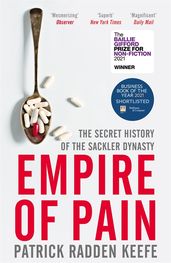The OxyContin scandal, Painkiller & Empire of Pain: your questions answered
Your questions about the OxyContin scandal and the Sackler family – including TV show, Painkiller, and book, Empire of Pain – answered.

The OxyContin scandal has exposed the dark underbelly of the pharmaceutical industry and sparked widespread outrage.
In his article for The New Yorker, Patrick Radden Keefe dissected the history of Purdue Pharma, OxyContin and the role of the Sackler family in its creation and distribution, which also went on to be the focus of his fourth non-fiction book, Empire of Pain. Since then, Netflix's Painkiller has brought the story from the page to the small screen.
Here, we answer all your questions about the book, the TV show and the scandal itself.
Is Painkiller on Netflix a true story?
Painkiller on Netflix is a dramatised limited series based on a true story, specifically focusing on the origins and impact of the opioid crisis in the United States. The series is inspired by real-life events and the role that Purdue Pharma and the Sackler family played in the marketing and distribution of OxyContin, which led to widespread addiction and a public health crisis. This shocking true story was originally told in Patrick Radden Keefe's masterpiece of narrative reporting and writing, Empire of Pain.
Many of the characters in Painkiller are fictionalised amalgamations of real people. For example, Edie Flowers – a lawyer played by Uzo Aduba – is a composite character based on numerous professionals who investigated Purdue Pharma and the manufacturing of OxyContin.
What is the OxyContin drug scandal?
The OxyContin scandal revolves around the pharmaceutical company Purdue Pharma and its aggressive marketing of the opioid painkiller OxyContin, which contributed significantly to the opioid crisis – where many people have become addicted to the drug, sometimes leading to overdose – in the United States. Introduced in 1996, OxyContin was promoted as a revolutionary painkiller with a low risk of addiction, based on misleading information.
Purdue Pharma, owned by the Sackler family, targeted doctors with deceptive marketing, claiming that the drug’s time-release formulation would minimize addiction risks. However, OxyContin's high levels of oxycodone, a powerful opioid, led to widespread misuse, addiction, and overdose deaths. The company’s tactics included offering incentives to doctors and using patient testimonials to promote the drug’s effectiveness.
As addiction rates soared, investigations revealed that Purdue Pharma was aware of the risks but continued to prioritise profits over safety. In 2007, the company and three executives pleaded guilty to criminal charges, paying over $600 million in fines. Despite this, the damage had been done, with OxyContin implicated in hundreds of thousands of opioid-related deaths.
The scandal sparked a national crisis, leading to lawsuits, public outrage, and increased scrutiny of pharmaceutical practices, ultimately contributing to Purdue Pharma's bankruptcy and a broader reckoning with the opioid epidemic.
Did any of the Sacklers go to jail?
No, none of the Sackler family members went to jail. While Purdue Pharma and three of its executives pleaded guilty to criminal charges in 2007 and paid substantial fines, no Sackler family members were criminally prosecuted or imprisoned in connection with the OxyContin scandal.
The family has faced numerous civil lawsuits, and in recent years, they agreed to a multi-billion-dollar settlement as part of Purdue Pharma's bankruptcy proceedings. However, this settlement included provisions granting them immunity from further civil litigation related to the opioid crisis.
Is OxyContin still on the market?
Yes, OxyContin is still on the market, but its availability and usage have been significantly restricted. In some areas, OxyContin has been withdrawn from the market entirely, and its use has declined as medical professionals and patients have become more aware of its risks. Additionally, there has been a broader shift towards non-opioid pain management strategies in response to the opioid epidemic.
What is the book about Sackler OxyContin?
Empire of Pain
by Patrick Radden Keefe
Empire of Pain by Patrick Radden Keefe is a comprehensive and deeply researched account of the Sackler family, their rise to wealth and power, and their role in the opioid crisis through their ownership of Purdue Pharma.
From the rural communities ravaged by the impact of opioid addiction to the hallowed halls of some of the world’s most respected cultural and education institutions, the Sackler’s unsavoury legacy in America is undeniable. As compelling as a thriller, Patrick Radden Keefe masterfully weaves a story of ambition, greed and secrecy and uncovers how the Sackler family made a fortune from other people’s pain and how they were allowed to get away with it.



